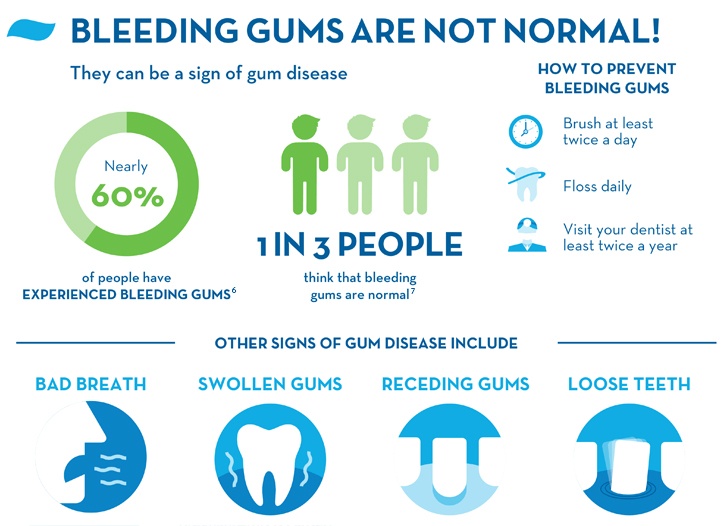- Home
- Oral Care Tips
- Solutions
Bleeding Gums: Causes, Treatments, and Prevention
What do Bleeding Gums Mean?
Bleeding Gums Causes
Treatments: How to Stop Bleeding Gums
While caring for your teeth is important, many people forget the value of caring for your gums as part of an important oral hygiene regimen. They are the foundation of a healthy mouth and if you're not taking care of them, you're really at risk for oral health issues. Since gums provide important support for your teeth, take good care of them and take action if you notice bleeding gums.
What do Bleeding Gums Mean?
Problems such as bleeding gums can be a sign that your gums are not being properly cared for and need more attention. While you don't need to panic if you notice bleeding gums, you do need to take action to help prevent the progression to a more advanced form of gum disease. Since so many people have gingivitis and bleeding gums, people often don't take it seriously enough.

Bleeding Gums Causes
The Most Common Cause
Bleeding gums are most often caused by harmful plaque – and the millions of bacteria in it – found at or below the gum line being left to develop into gingivitis. Gingivitis, a mild form of gum disease, may require treatment and improved oral hygiene to help eliminate it. If left untreated, bleeding gums and gingivitis can lead to a more serious form of gum disease called periodontitis.
Other Causes
If you don’t have gingivitis, but still suffer from bleeding gums, don’t ignore the problem. Bleeding gums can also be caused by bleeding disorders, leukemia, vitamin K deficiency, hormonal changes, scurvy or the use of blood thinners. If you notice bleeding from your gums, it’s best to consult with your dentist or doctor to determine the cause.
How to Stop Bleeding Gums
There are many ways to help improve your oral health and help eliminate bleeding gums. Since bleeding gums are mainly due to inadequate plaque removal from the teeth at or below the gum line, starting an effective oral hygiene regimen is a great way to help treat and prevent gum bleeding. Here are some oral hygiene tips that will help you keep your entire mouth healthier and help prevent or reduce gum bleeding:
- Brush Often: Brushing with a soft-bristle toothbrush in a circular motion will help stimulate your gums, help prevent bleeding gums and strengthen the tissue that protects your teeth. All Crest Pro-Health toothpastes are triclosan-free.
- Brush with Anti-Gingivitis Toothpaste: If you struggle with bleeding gums, you may want to consider a toothpaste like Crest Gum Detoxify Deep Clean that can help neutralize the plaque bacteria found around the gum line. Also try Crest Gum & Enamel Repair, which also helps repair weakened tooth enamel These toothpastes are formulated to help reverse early signs of gum disease.
- These toothpastes are formulated to help reverse early signs of gum disease.
- Floss Daily: Flossing is one of the most important ways to help prevent bleeding gums and maintain good oral health. It removes plaque and food particles that may be under the gum line and lead to bleeding gums.
- Combine for Best Results: For best results, use multiple products together to keep your mouth, gums and teeth healthy. A comprehensive system such as the Crest Pro-Health regimen features a variety of products that work well together, including Crest Gum Detoxify, Crest Pro-Health Multi-Protection Mouthwash, Oral-B Electric Toothbrush and Glide Deep Clean Floss
- Avoid Tobacco: Tobacco use can damage your gums, and can also make you far more likely to develop gum disease.
- See a Dentist Regularly: Harmful plaque bacteria can even lead to issues beyond gingivitis like weakened tooth enamel. The cleaning performed twice a year at your dentist's office will remove plaque and tartar that can’t be removed at home. This will help prevent bleeding gums and keep your mouth healthy. You should visit your dentist for a professional cleaning and dental exam at least twice in a year. This can help prevent early gum disease from progressing into more serious gum disease.
- Maintain a Healthy Lifestyle: The Canadian Dental Association recommends eating nutritious foods to help build strong teeth and gums. Also, reducing stress from your life can help prevent gum disease.

Sources:
- http://www.webmd.com/oral-health/guide/gum-problem-basics-sore-swollen-and-bleeding-gums#2-9
- https://www.perio.org/consumer/gum-disease.htm
- https://medlineplus.gov/ency/article/003062.htm
- http://www.webmd.com/oral-health/guide/gum-problem-basics-sore-swollen-and-bleeding-gums#1
- http://www.cda-adc.ca/en/oral_health/cfyt/good_for_life/

